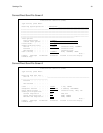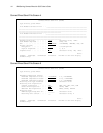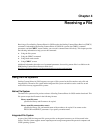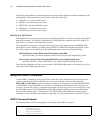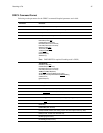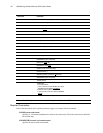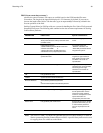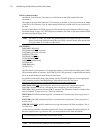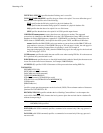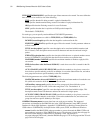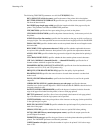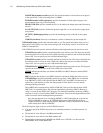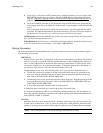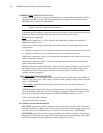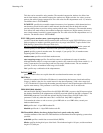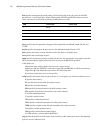
Receiving a File 51
TEXTFILE(*YES|*NO) specifies that the file being sent is a text file.
TYPE(FILE
|MBR|OBJ|SPLF) specifies the type of data to be copied. You must define the type of
data structure to be copied as one of the following:
FILE
specifies that the file being copied is a physical database file.
MBR specifies that the member being copied is a member of a physical database file.
OBJ specifies that the data to be copied is in save file format.
SPLF specifies that the data to be copied is in i5/OS spooled output format.
CODEPAGE(nnnnn,nnnnn) converts data from one code page to another. The supported
conversions are identified on the IBM Web site in the V5R1 Information Center, DB2 Universal
Database for iSeries SQL Reference, Appendix E. CODEPAGE() on Sterling Connect:Direct for
i5/OS relates to CODEPAGE() developed for the z/OS system, UNIX, and Microsoft Windows.
nnnnn identifies the IBM CCSID code page number to convert from and the IBM CCSID code
page number to convert to. If the FROM code page or TO code page is locale, the code page for
the locale where Sterling Connect:Direct is executing is used. For example, if
fmsysopts(codepage(locale,1208)), then the FROM code page is the code page for the locale and
the TO code page is UTF-8.
CCSID(nnnnn) specifies the coded character set ID to use when creating IFS files. If no character set
ID is specified, the system default is used.
EORCHAR(xxxx) specifies the two-to four-digit hexadecimal symbol to identify the character to use
in text files as the end-of-record character, for example, EORCHAR(0A).
ALWNULL(Y) specifies if NULLS characters will be processed when sending DB2 files.
TOSYSOPTS(‘
DECMPR(*YES|*NO
)
EXITCMD(valid i5/OS command)
FAILCMD(valid i5/OS command)
TYPE(FILE
|MBR|OBJ|SPLF)
XTRAN(table-name) [XTRANLSO(so-code)|
XTRANLSI(si-code)|XTRANLDATA(MIXED
|DBCS)]
CCSID(nnnnn)
EORCHAR(xxxx)
’)
specifies system operation parameters at the local node (i5/OS). The maximum number of characters
permitted for TOSYSOPTS is 2K.
DECMPR(*YES|*NO
) specifies whether the local Sterling Connect:Direct is to decompress the
received file. DECMPR(*NO) instructs the local system to place the received data in a database file
without decompressing it.
EXITCMD(valid i5/OS command) specifies a command to be executed only if the copy process is
successful.
FAILCMD(valid i5/OS command) specifies a command to be executed only if the copy process is
not successful.
Note: Ensure that the destination file contains no members before you receive a file with
DECMPR(*NO) specified.



